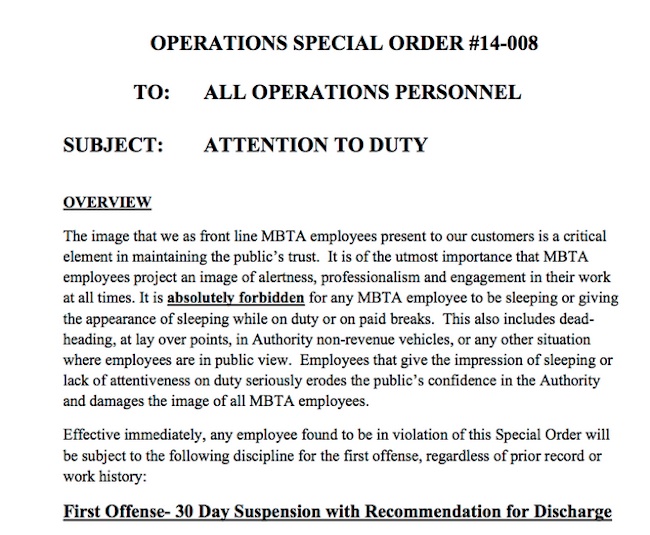For MBTA Employees, Sleeping Is Now a Fireable Offense
In the past month, two MBTA employees were allegedly caught sleeping on the job, and the embarrassment it caused the transit agency was enough for them to change the procedure for punishments for such behavior.
On Thursday, MBTA officials sent out a letter to more than 1,000 employees—including operators, inspectors, managers, and drivers— “absolutely” forbidding anyone from sleeping or napping while both on the clock or on paid break on T property, “or any other situation where employees are in public view.”
Prior to the issuance of this “Special Order,” the level of discipline was determined, in large part, by an individual employee’s work history and a review by their supervisor, according to MBTA spokesman Joe Pesaturo.
Now, if an employee is caught nodding off or even “dead-heading” while on company time—no matter their work history—that employee will be placed on a 30-day suspension with a recommendation for discharge. Pesaturo said a call for “discharge” means “termination of employment with the MBTA.”
The letter sent to employees, which was emailed to radio host Michael Graham, and provided to Boston with permission, reads:
The new special order distributed on Thursday was likely prompted by the two incidents in January.
One photo of an employee, who was not identified by the MBTA, showed her slouching in a seat behind the plexi-glass of one of the kiosks set up at the Oak Grove Orange Line station in mid-January. The Orange Line Inspector, a seven-year employee, was removed from service while an investigation took place.
It was the second time a rider recently caught a T employee with their eyes closed while at work. On January 27, a passenger snapped a picture of a 27-year veteran nodding off at his desk at a Park Street station booth.
These incidents were followed by a series of other sleeping workers captured by riders on camera in recent years. Officials from the MBTA have called the act of sleeping on the job “disgraceful behavior” that they deem inexcusable. “It’s a disservice to the vast majority of T employees who are working hard every day to help deliver safe and reliable services,” Pesaturo said in a previous interview.
Besides the new procedure to handle tired T workers, the MBTA makes employees take, and review, a fatigue awareness program, which stresses the importance of good sleep practices.


